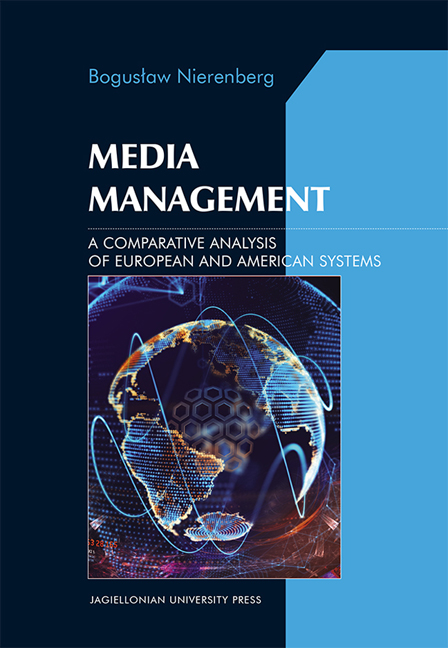Introduction
Published online by Cambridge University Press: 10 January 2018
Summary
It seems obvious and trivial to state that the basic determinant of the contemporary world is its mediality. Meanwhile, the platitude of some phenomenon is, in no way, synonymous with its common understanding. Mediality does not stand for the knowledge of its governing rights, either. It appears that the case is similar with media management. Europe, including Poland, differs in this respect from the United States. One of the weaknesses of the Polish economic and social situation, for example, results from the inability to govern. In Poland it is the doctor who manages a hospital and the actor who is in charge of the theater. Obviously, it could be both the doctor and the actor, provided that they possess the relevant competency in scope of management. For management is not arcane knowledge. It can be learned. Media management can be learned as well.
The aim of this monograph is to compare scientific output in the scope of media management; focusing on the United States as well as on European countries, primarily Poland, and sharing the results of the research which I have been conducting for many years. From my point of view, in order to understand the essence of contemporary media management, there are two statements by Peter Drucker which are crucial to consider. First: “information shall always be a basic resource of the 21st century, and, the second: the more common information, the more valuable.” In so far as the first maxim seems to be quite commonly accepted, although the consequences of such a statement are not always brought to one's attention, the latter one demolishes the foundations of traditional economic knowledge. In classic economics it is assumed that the rarer good, the more precious it is and vice versa. Universal availability of a given good lowers its price. However, research by P. Drucker contradicts this thesis. In this book I have attempted to clarify this apparent contradiction by media dualism described in 1989 by Robert Picard and my own formula of “media buttons (informational)” which made it possible to comprehend the paradox captured by P. Drucker's findings. An explanation of these problems is included in Chapters Two and Three.
- Type
- Chapter
- Information
- Media ManagementA Comparative Analysis of European and American Systems, pp. 9 - 16Publisher: Jagiellonian University PressPrint publication year: 2016

